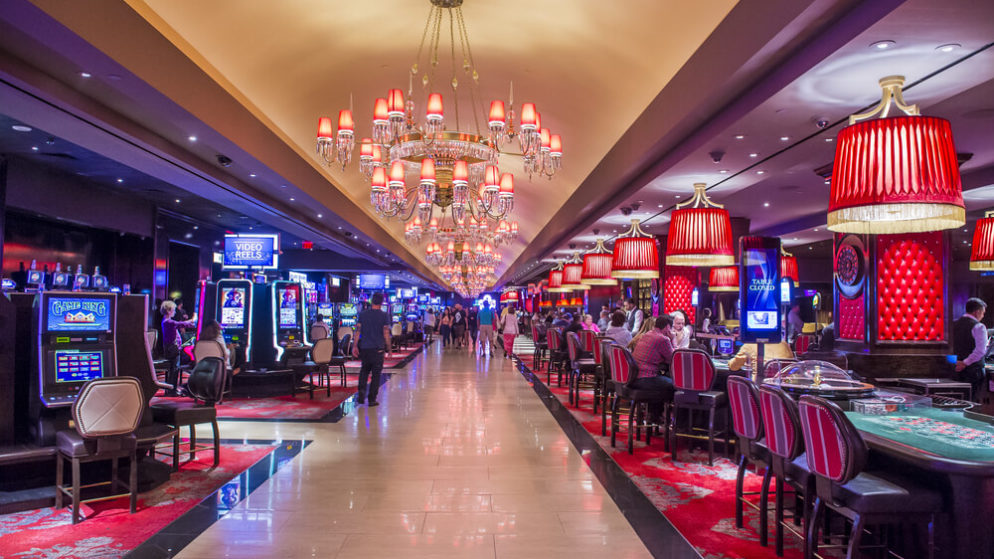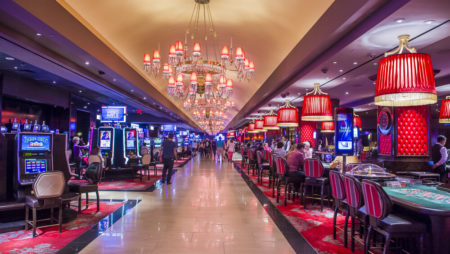

Gambling addicts still gambled, despite stay-at-home orders, casinos closures and a suspended sports season.
Las Vegas has arisen from its shutdown-induced coma. Nevadans continue to test positive for COVID-19, and Black Lives Matter protesters march through the city, but none of that has stopped people from across the US from defying the unending shelter-in-place orders in their states to come to Las Vegas. Pictures from more than two dozen casinos that welcomed guests back showed off gaming tables surrounded by gamblers, some wearing masks, but most shunning the stifling face coverings.
Their eagerness to get out and play is understandable. During what seems to be an unending lockdown, gambling addicts have struggled to find a substitute for the casino experience. While overseas gamblers have been able to legally gamble online under lockdown, American gamblers face a hodgepodge of state laws with limited options for legal online gambling. This has proven both a blessing and a bane for American gambling addicts.
What we cover
American Online Gambling in Its Infancy
The online gaming industry in America is still in its early stages. Delaware legalized online casino games back in 2012. New Jersey, home to the east coast’s casino capital, Atlantic City, did so in 2013. Last year, Pennsylvania launched its online gaming market. Nevada has allowed online poker for more than seven years, but still bans online casino games.
During the entire month of April, and well into June, gamblers in those four states discovered the joys of online gambling. Online and mobile wagers in Pennsylvania were up by $500 million compared to March. The revenue of Delaware’s online casinos went up by two-thirds. New Jersey’s online gambling revenue shot up by 23%. The online poker rooms in Nevada experienced a tremendous increase in traffic immediately following the shutdown.
However, these four states, comprise only 8% of the country’s population. Furthermore, online gambling is illegal across state lines; something online casinos try to comply with. Using “geofencing” technology, online gambling websites collect IP addresses and use Wi-Fi and GPS data to ensure a gambler’s mobile device or computer is within the state. That means, gamblers in states without legal online and mobile gambling must look elsewhere. This has caused much stress to gambling addicts in some states, where land-based casinos remain closed.
Sports Betting Fills a Gambling Need
Sports betting is a viable option for some gambling addicts to online slots and casino games. The Supreme Court, two years ago, opened the door for any state to have legal sports betting, and since then, eighteen states have established sports betting markets, allowing 100 million citizens to legally bet on sports. A burgeoning industry has emerged since the Supreme Court’s decision, with DraftKings and FanDuel at the forefront. The two sports betting giants combine fantasy sports and real sports betting, taking the country by storm. Last September, the Fox media conglomerate launched its own Fox Bet platform. Traditional casino companies, such as MGM Resorts, Caesars Entertainment, and the Tropicana have expanded their sportsbooks beyond Nevada.
On the Whole, the Gambling Industry Has Been Devastated by the Lockdowns
However, while online gambling has increased, the gambling industry as a whole has been devastated by the pandemic lockdowns. With most professional-sports leagues in America are suspended, online sportsbooks have made up the shortfall by taking bets on Belarusian soccer and South Korean baseball. E-sports also attracted much more attention during the pandemic, and have become more popular as well. However, none of these commands the same volume of wagers as Major League Baseball, which should now be in full swing. Likewise, the National Basketball Association and the National Hockey League would normally be into their post-seasons.
Betting at New Jersey sportsbooks fell by 68% in April. However, investors remain optimistic. The shares for DraftKings’ have doubled since they were first listed in April. Now that baseball, basketball, and hockey leagues are all poised to come back this summer, sports betting will come to the forefront.
Once the National Football League kicks off this fall, sports betting will go into hyperdrive. Gamblers still leery of a crowded casino could turn to online sports betting. Unable to watch their teams for most of 2020, they could put down casual bets on their favorite teams.
With state governments’ economies devastated by shutting down “nonessential” businesses and increased spending on things like COVID-19 testing, state legislatures may turn to expand their gambling markets. The financial stress of the 2008 recession caused eight states to expand gambling, leading to the opening of new casinos and horseracing tracks, producing millions of dollars in additional tax revenues.
Now, many states are interested in legalizing sports betting, undoubtedly eyeing the $36 million New Jersey raked in this last year. Virginia, Washington state, and Oklahoma have all legalized sports betting since the pandemic shutdowns began. Gambling legislation is currently on the table in Massachusetts and Ohio. Most notably, the 40 million residents of California may be able to gamble on their favorite teams soon. States that already have legal sports betting may broaden their online gambling options.
More States with Legalized Gambling Could Make Gambling Addicts Worse
More legalized gambling across the country could make things harder for those with a habitual gambling addiction. Ironically, the pandemic shutdowns haven’t stopped problem gambling, despite the closing casinos. In fact, the closures could have made their addictions worse. “Nearly every factor that is believed to contribute to problem gambling now exists in increased measure,” said former casino executive Alan Feldman. Feldman now chairs Nevada’s advisory committee on problem-gambling.
The issue of exacerbating the problem of gambling addicts has consistently been one of the reasons why New York has failed to expand gambling options in the state.
Mass layoffs and a declining stock market created a need for gambling addicts to “win back” lost paychecks and depleted savings. Likewise, many gambling addicts also struggle with substance abuse problems. The isolation dictated by the lockdowns has erected a roadblock for recovery for anyone struggling with an addiction. Public-health budgets, redirected to COVID-19, stretched tight by falling tax revenue are finding it difficult to support services for gambling addicts.
While online casinos are illegal in most states and sports leagues remain suspended, illegal online options are available. Offshore online casinos, usually hosted in Gibraltar or the Philippines, circumvent US regulators, raking in billions from Americans each year. These are especially alluring to gambling addicts. State and local lotteries have increased in popularity and some gambling addicts have turned to social-media games with in-app purchases. “Anyone who is truly a gambling addict,” said Kody Kinsley, the Deputy Secretary for Behavioral Health and Intellectual and Developmental Disabilities at the North Carolina DHHS, “will find a way to gamble no matter the situation.”








